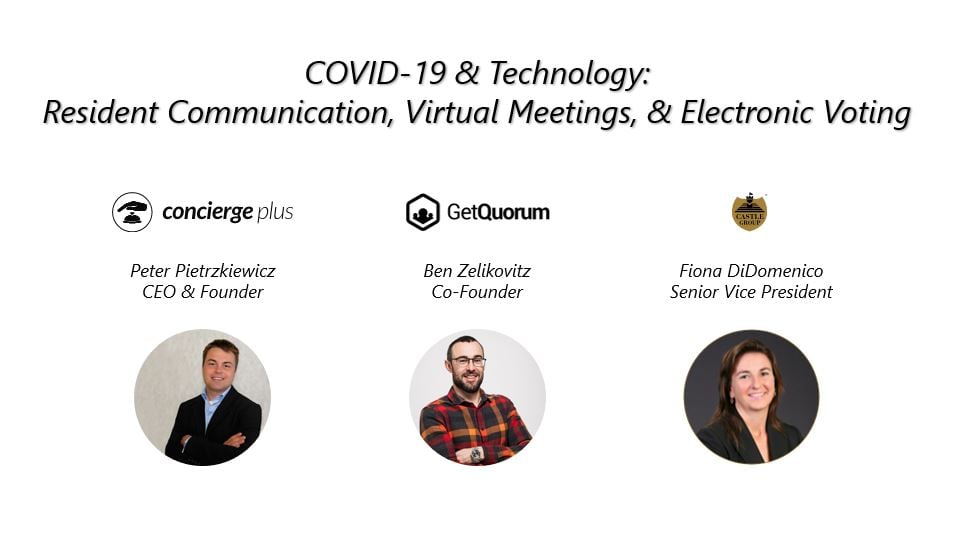Almost every part of society has been hit hard by the coronavirus, and associations are no different. With the COVID-19 pandemic throwing the brakes on everyday community activity and the annual general meeting (AGM) season upon us, technology can empower association members or association boards to enhance operational efficiency and deliver a digitally connected resident experience. Technology can also be used to protect both employees and residents during this unsure time.
To help property managers and associations navigate these issues, we created a webinar specifically relating to COVID-19. Entitled “COVID-19 and Technology: Resident Communications, Virtual Meetings, and Electronic Voting,” we invited experts in the field of property management technology to give helpful tips and advice for successfully managing a property virtually.
Peter Pietrzkiewicz, CEO and Founder of Concierge Plus, and Ben Zelikovitz, Co-Founder of GetQuorum, all weighed in on how property managers and associations can continue to serve the needs of residents during urgent situations, including COVID-19.
More than 200 property managers and board members attended our webinar, and here are some key takeaways from the webinar to provide help and insight during this unprecedented time:
People are Critical During Urgent Situations
While the coronavirus is unprecedented in how widespread it is, it is not the first time most associations have faced an emergency. Floods, earthquakes, hurricanes, elevator outages, and water shutoffs are just a few kinds of urgent situations requiring critical action and adaptation.
It is during these times of urgent situations that residents view managers as trusted advisors and expect relevant communication. Decisions have to be made that affect the health and well being of residents, so an increase in transparency, as well as engaging in inclusive and consistent communication, is vital.
Be proactive
Proactive property managers build confidence with residents when they come out on top of a situation. Don’t wait for an emergency to develop before you start your response. Instead, create a proactive plan and communicate it with your residents.
It’s impossible to have a proactive response without leveraging automation and technology, though. It is too labor-intensive and time-consuming to reach out to everyone manually in response to a crisis. Technology can help ensure that property managers have a fast response to any emergency, even if they can’t be in the building.
Improve communication channels
There will be a new normal after COVID-19. Boards cannot simply flip a switch to go back to the same operational style as existed pre-coronavirus. The days of having dozens of lounge chairs at the pool and tightly packed gyms may be over. The days of having an open-door policy in the Association office will likely cease. Some residents like to congregate in the association office for a variety of reasons, but that activity has never been terribly helpful let alone now.
Many associations are caught off-guard with the challenges presented in recent months. The communication needs of their residents, from trying to get a hold of managers they cannot physically see, to increased shopping and delivery that needs to be handled, increase during times of crisis.
Some communication channels that property management needs to consider include:
-
Announcements. Announcements keep residents informed about all relevant matters. However, an email blast alone does not ensure that all residents received the information. Display screens, texting, and even calling might be necessary for older residents.
-
Deliveries. As residents are more limited in how they can shop, deliveries for online orders will increase. Physical logs are not only inefficient but could pose a safety hazard as most people would like to minimize physical contact during COVID-19. There needs to be a system to quickly process incoming packages, notify residents wherever they are, and collect digital signatures.
-
Discussion Forums. Residents still want to be a part of their community, especially during times of social distancing. However, Facebook groups can be destructive when someone hides behind an anonymous profile. Instead, management should provide a safe, controlled space where only valid and current residents can participate.
-
Service Requests. Even in urgent situations, regular maintenance issues happen—burnt-out lightbulbs, leaky faucets, etc. Technology can not only keep residents from coming to the front desk or management office, but workflow technology can help you get through requests quickly.
-
Amenity Bookings. When BBQs, party rooms, clubhouses, guest suites, and the like are shut down, you need to communicate and refund any reservations as quickly as possible. Technology lets you do so in a couple of clicks rather than manually informing every resident and refunding those who paid for reservations. Furthermore, boards may start using a reservation system for certain amenities to better enforce social distancing.
With improved communication channels, you can quickly notify residents of any changes, manage their requests, and handle changes efficiently.
Take meetings online
While the coronavirus rages, traditional owner meeting won’t take place. We cannot even be sure what the world will look like after stay at home measures relax. Now is the time to start taking these meetings online, whether as online-only or hybrid, to make sure that essential measures can be passed, and more members can participate even when they cannot attend in-person. It also has the bonus of reduced cost and effort, while still adhering to social distancing measures.
Maintain a safe and connected community during COVID-19
While COVID-19 may have changed the way we do business, that doesn’t mean that you still can’t provide a high level of service for residents.
Want to learn more ways you can use technology to run an effective association during any emergency? Watch the full webinar here!




Share This Post